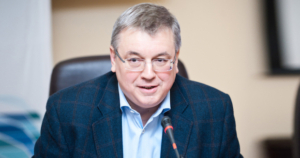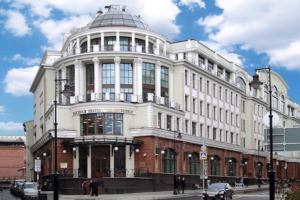
End of ‘liberal era’ at top Russian university

The resignation last week of the head of Russia’s Higher School of Economics (HSE) generated shockwaves that reached far beyond academic circles. Economist Yaroslav Kuzminov confirmed Friday that he was stepping down as dean of the university he founded in the 1990s and which is today Russia’s finest institute of higher education.
Who is Yaroslav Kuzminov? Kuzminov’s story is closely intertwined with HSE. A Soviet-era economist, he was appointed dean when the university was set-up in 1992 by a decree of then-Prime Minister Yegor Gaidar, one of Boris Yeltsin’s closest allies. He is the husband of Elvira Nabiullina, the influential head of Russia’s Central Bank.
Why is HSE special? HSE was the first new university established in Russia after the collapse of the Soviet Union — and it turned out to be the most successful. This year, it was ranked in the top 25 universities worldwide and the top 3 in Russia by the Times Higher Education Emerging Economies. The most recent Forbes academic rating put HSE top in Russia, ahead of Moscow State University (MGU).

From day one, HSE built its reputation on a strong academic team, strict and transparent entry requirements for students, high teaching standards and a focus on research. Konstantin Sonin, a professor at Chicago University and HSE, compared Kuzminov with legendary MGU founder Mikhail Lomonosov. “There is no comparable figure in our higher education between Lomonosov and today,” he wrote on Facebook.
Although HSE is renowned as a stronghold of liberal views, Kuzminov has always insisted the university be above politics. As well as dean, Kuzminov was a member of countless expert committees, a deputy in the Moscow city parliament and co-chairman of the Moscow branch of the pro-Kremlin All-Russia Popular Front. Kuzminov also worked on economic and public administration reform programs.
What’s the background to Kuzminov’s departure? HSE has become repeatedly embroiled in political scandals in recent years. Outspoken student magazine Doxa lost its official status at the university in 2019, and when Doxa’s editorial staff faced criminal prosecution earlier this year, the university released a widely-condemned statement that merely said they understood “the wish of several colleagues to support their students and graduates”. Another controversial move was the expulsion of post-grad student Yegor Zhukov who became an opposition symbol when he was put on trial in the wake of 2019 Moscow protests.
During winter rallies in support of opposition politician Alexei Navalny, Kuzminov said it was unacceptable for HSE to allow itself to be dragged into political struggles. “The university should not agree to live by the law of the street, nor the law of the barracks,” he said at the time. HSE formally banned students and staff from speaking about political matters on behalf of the university in 2020
The university’s stance has caused anger among both staff and students. Last year, former HSE teaching staff announced the foundation of a new, independent university.
Why did Kuzminov leave? Kuzminov explained his decision by saying he was tired of managerial responsibilities and did not enjoy taking “important, sometimes tough” decisions. Two of The Bell’s sources linked the rector’s resignation to his health and a weariness of constant compromise with the authorities. Independent television channel Dozhd reported a similar assessment of Kuzminov’s motives.
What happens next? The acting dean of HSE has already been named as Nikita Anisimov, the head of Russia’s Far East Federal University. It’s not yet clear what to expect from him, although it’s interesting that Russia’s leading university for economics will now be led by a mathematician who has no particular experience of either finance or economics.
Why the world should care: It’s hard to escape the cliché that this is the ‘end of an era’. This isn’t just about Kuzminov’s departure, but the official end of HSE’s liberal period.




